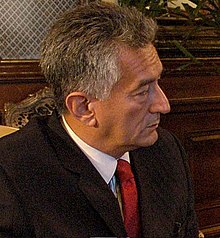Alberto Rodríguez Saá
| Alberto Rodríguez Saá | |
|---|---|
 |
|
| Governor of San Luis | |
|
In office December 10, 2003 – December 9, 2011 |
|
| Lieutenant | Blanca Pereyra (2003-07) Jorge Pellegrini (2007-11) |
| Preceded by | Alicia Lemme |
| Succeeded by | Claudio Poggi |
| Senator for San Luis Province | |
|
In office March 8, 2000 – March 14, 2001 |
|
| Senator for San Luis Province | |
|
In office December 10, 1983 – December 14, 1994 |
|
| Personal details | |
| Born |
August 21, 1949 San Luis, Argentina |
| Political party | Justicialist Party |
| Profession | Lawyer |
Alberto José Rodriguez Saá (born August 21, 1949) is an Argentine lawyer and politician. He was elected governor of San Luis Province in 2003, serving until 2011. He was twice a presidential candidate for center-right, Federal Peronist tickets: FREJULI, in 2007, and Federal Commitment, in 2011.
The Rodriguez Saá family is well known in the Province of San Luis and can be traced to the nineteenth century and to descendants of the Federalist revolutionary Juan Saá, an important figure in the Argentine Civil Wars of the mid nineteenth century. His brother, Adolfo Rodríguez Saá, was governor of San Luis from 1983 until 2001, when he became interim President of Argentina, resigning after a week.
Born in San Luis, Rodriguez Saá completed his undergraduate studies at the University of Buenos Aires where he earned a Law degree in 1974, specializing in Constitutional Guarantees. He married María Antonia Salino, and they had three children; they were later divorced.
He was hired as a legal advisor to the CGT, the nation's largest trade union, in 1980. Between 1983 and 1994, he served as senator for the Province of San Luis. Serving this position in 1986, he voted against the Ley de Punto Final that established the suspension of legal proceedings against the perpetrators of illegal detentions, torture and murder during the military dictatorship. Between 1989 and 1993 he was President of the Justicialist caucus in the Argentine Senate. With presidential aspirations of his own, in October 1993 he voted against the government project to amend the National Constitution and allow the reelection of the then-President Carlos Menem, known as the "Pacto de Olivos". This has been linked to the kidnapping of his brother shortly afterwards. He resigned from his seat in December 1994.
...
Wikipedia
